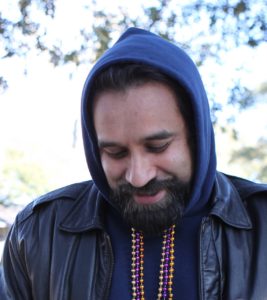by Jake Brewer

Some fiction writers focus on character, others on plot, still others on fleshing out the regional location of their work—this setting, in turn, becoming a character as much as any other. Shome Dasgupta manages to focus on all three of these aspects in his short novel Pretend I Am Someone Like You, released by the University of West Alabama’s Livingston Press in 2018.
Pretend I Am Someone Like You follows Mutty, a young man living in Southern Louisiana, his mute cousin Barn, his “girlfriend” Pepper (their relationship is, initially, uneasily defined), and his mother, Ma. Mutty and Barn are tied together by their lack of father figures and Dasgupta capably conveys a brother/uncle/father relationship between Mutty and Barn. Things get more complicated when Pepper comes on the scene and integrates with the family, and even more so in the second half of the novel when Pepper’s own absent father and his cohort are added to the mix. At this point the novel swings more into a crime story that uses rural Louisiana as a backdrop. However, as interesting as the characters can be, this novel really shines in its unique prose.
Pretend I Am Someone Like You is an extended poem as much as it is a novel. Or, to put it another way, Dasgupta’s voice is one of fiction but his ear is that of a poet’s—the sound within each line, the strategic and hard-hitting repetition, even the names of the characters, all prove this so. The lines are lyrical, simple, and beautiful alone and also in their solidarity with one another.
The chapter “The Wandering Goat” features one example of this repetitive and solitary style: “See Pepper on the floor. See the humming. Hear Pepper on the floor. Hear the humming. Pepper was on the floor again. She had red speckles in her hair…”
The novel stumbles, however, in its attempt to fuse character-focused prose and crime-genre plot trappings. The first half of the novel is a poetic character study of Mutty, Barn, Pepper, and to a lesser extent, Ma. In the first half, we see Mutty and Pepper grow closer, we see Barn dealing with the traumas in his life, we see Ma keep a rural Louisiana household together by grit and love. Yet, the second half of the novel, if stripped of Dasgupta’s electric prose and only-sometimes-hollow characters, might be a completely different book altogether. While the writing continues to be poetic and interesting, the novel switches into a fairly simple tale of a rural criminal enterprise run by Pepper’s family, and also the sexual and physical abuse that Pepper suffers in relation to this criminality.
This switch can be seen in the appearance of the villains of the piece. Aside from those characters already mentioned, the rest are, for the most part, brutal, foul men with naught but sex and violence and destruction on their minds. These characters, unlike our main cast, are not given proper names but are rather characterized by Mutty’s nicknames for them: The Dirty Man, the mumbling man, and the employee. Only two male characters outside of Mutty and Barn have any dimensionality: Pierre (Mutty’s absent father) and Uncle Gerald (Barn’s absent father), who over the course of the novel experience deft character growth and interesting complications.
But for the most part, these angry male characters serve as one-dimensional beasts rather than useful foils to our protagonist(s). Their sexual leanings also become problematic in relation to Pepper’s character, who, as a victim of sexual abuse, seems at times only to express characterization through Mutty and through sex. Almost every scene between Mutty and Pepper begins or ends with sex. This fact, combined with Pepper’s survival of sexual abuse, often feels like a problematic way to convey her character.
That being said, Dasgupta’s prose manages readers through scenes sexual and otherwise that would not function in the hands of a lesser writer. He raises moments of the mundane and squashes moments of extremity: Barn’s attempts to fly from the roof are written in long and loving detail, while murder happens in a single phrase or sentence.
Pretend I Am Someone Like You deals in themes of trauma—physical, sexual, emotional; in absent fathers; in the relationships between age, responsibility, and duty; and finally with crime. For the most part, and particularly aside from a problematic moment in the climax featuring a gun-wielding Barn, Dasgupta succeeds in bringing to the fore these concepts in easy harmony. The novel features multiple breathtaking and sad moments that fuse these themes together. One such is Mutty and Pepper’s burial of a road-killed dog (a sequence first published in Rougarou as a short story). As they dig the hole, they discuss their own mortalities in the interior code of lovers. They strip their clothes off and leave the burial site together, naked, but more whole than they were beforehand.
For lovers of the rural-crime genre (consider Daniel Woodrell and John D. MacDonald), Pretend I Am Someone Like You will scratch an itch. For lovers of poetry, the book will do the same. Despite missteps in organization and plotting, Dasgupta has succeeded in creating a distinct work of art that feels as unique to Louisiana as Mutty’s family, while at the same time conveying a connectedness of the human experience that transcends class, locale, and perhaps even genre.
